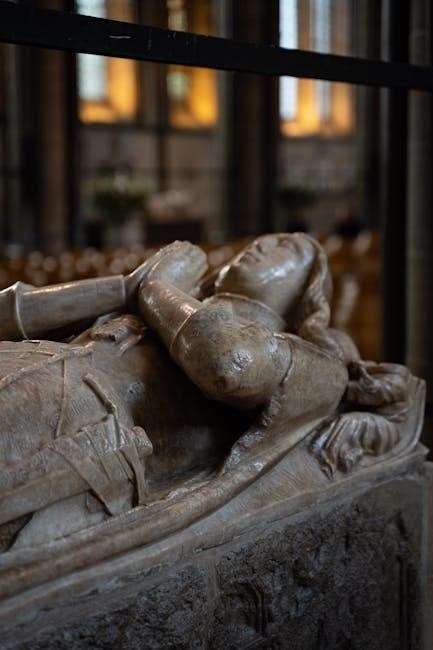John Gardner’s 1971 novel Grendel reimagines the Beowulf legend through the monster’s perspective, offering a dark, introspective narrative that explores themes of existence and morality in a fragmented world․

Historical and Literary Context
John Gardner’s Grendel, published in 1971, is a postmodern retelling of the Old English epic poem Beowulf, offering a fresh perspective by narrating the story from the monster’s viewpoint․ This literary approach reflects the cultural and intellectual shifts of the 1970s, a period marked by a growing interest in alternative narratives and existential themes․ Gardner, a scholar of medieval literature, drew heavily from Beowulf while subverting its traditional heroic framework․ The novel’s exploration of morality, ambiguity, and the nature of monstrosity resonated with the era’s focus on questioning established norms and structures․ By reimagining Grendel as a complex, introspective character, Gardner challenged the binary opposition of good and evil, aligning with the broader literary movement of the time that sought to deconstruct classical narratives․ This unique adaptation not only reinvigorated interest in Beowulf but also established Grendel as a significant work of contemporary literature․

Themes in Grendel
The novel explores existentialism, questioning meaning in a chaotic world, and the struggle between good and evil, highlighting moral ambiguity․ Grendel’s internal conflict mirrors the fragmented nature of human existence, challenging traditional heroic narratives․
Existentialism in Grendel
John Gardner’s Grendel delves deeply into existentialist themes, presenting the monster as a symbol of existential crisis․ Grendel’s narrative explores the search for meaning in a seemingly meaningless world, reflecting the philosophy of Albert Camus and Jean-Paul Sartre․ The monster’s internal dialogue reveals his struggle to define his purpose, oscillating between nihilism and a desire for connection․ His encounters with the Dragon, who embodies a cynical, nihilistic worldview, and the Shaper, who represents the power of storytelling to create meaning, further highlight his existential dilemma․ Grendel’s ultimate inability to reconcile his own nature with the world around him underscores the existentialist notion of the absurd․ Gardner’s portrayal of Grendel as a thinking, feeling being challenges traditional notions of good and evil, emphasizing the complexity of existence․ Through Grendel’s journey, Gardner explores the tension between seeking meaning and embracing the chaos of an indifferent universe, making the novel a profound exploration of existentialist philosophy․
The Struggle Between Good and Evil
In Grendel, John Gardner reimagines the classic battle between good and evil through the monster’s perspective, challenging traditional notions of morality․ Grendel, often depicted as a one-dimensional antagonist in the original Beowulf, emerges as a complex figure grappling with his own nature․ His narrative reveals a deeply conflicted character, torn between his inherent violence and a desire for understanding; Gardner subverts the simplistic dichotomy of good and evil, presenting Grendel as a symbol of chaos and existential despair․ The novel explores the idea that evil is not absolute but rather a product of circumstance and perception․ Grendel’s encounters with the Dragon, who embodies nihilism, and the Shaper, who represents the power of art to shape reality, further complicate his understanding of morality․ Ultimately, Grendel’s struggle reflects the ambiguity of human nature, where good and evil are not fixed but intertwined․ This nuanced portrayal challenges readers to question their assumptions about the nature of morality and the forces that shape it․

Major Characters in Grendel
Grendel, the existentialist antihero, narrates his struggle with identity and meaning․ Beowulf emerges as the heroic force opposing Grendel, while Unferth serves as a skeptical, complex warrior․ The Dragon and Shaper embody contrasting views of nihilism and artistic truth․
Grendel: The Monster’s Perspective
John Gardner’s Grendel offers a profound exploration of the monster’s psyche, transforming him from a one-dimensional beast into a complex, philosophical narrator․ Grendel’s perspective humanizes him, revealing his existential struggles and inner turmoil․ He grapples with meaninglessness, questioning the purpose of his existence in a seemingly indifferent world․ Through his interactions with the Dragon, Unferth, and Hrothgar, Grendel’s narrative challenges the traditional binary of good and evil, presenting a nuanced view of morality․ His observations of human society expose their flaws and contradictions, while his own actions reflect a deep-seated loneliness and frustration․ Gardner’s portrayal of Grendel as an antihero encourages readers to empathize with the monster, blurring the lines between villain and victim․ This reimagined perspective not only subverts the original Beowulf tale but also delves into universal themes of identity, alienation, and the search for truth․ Grendel’s voice, both haunting and introspective, remains a powerful commentary on the human condition․

Reception and Critical Response
Grendel received widespread critical acclaim for its innovative narrative and philosophical depth, though it was controversial upon release․ Critics praised Gardner’s ability to humanize the monster, offering a fresh perspective on the Beowulf legend․
Initial Reception and Reviews
Upon its release in 1971, Grendel garnered significant attention and mixed reviews․ Critics praised Gardner’s bold reinterpretation of the Beowulf legend, particularly his decision to narrate from the monster’s perspective․ The novel was hailed for its philosophical depth, exploring themes of existentialism and morality through Grendel’s conflicted voice․ However, some reviewers found the narrative challenging due to its non-linear structure and intellectual complexity․ Despite this, Grendel quickly became a bestseller, solidifying Gardner’s reputation as a major literary figure․ The book’s unique blend of dark humor, introspection, and philosophical inquiry resonated with many readers, though it also sparked controversy for its subversion of the traditional Beowulf narrative․ Over time, the novel has been recognized as a landmark work in contemporary literature, celebrated for its innovative storytelling and thought-provoking themes․
Availability of Grendel
Grendel by John Gardner is widely available in various formats, ensuring accessibility for readers worldwide․ The novel can be purchased in paperback, hardcover, and e-book formats from major online retailers such as Amazon, Barnes & Noble, and Google Books․ Additionally, many libraries offer copies of the book for borrowing, making it easily accessible to the public․ For academic purposes, Grendel is often included in university syllabi, and digital versions, including PDFs, can be found through educational platforms and online archives․ The book has been reprinted multiple times since its initial release in 1971, with editions featuring introductions by scholars and critics․ Its popularity has also led to translations into several languages, further expanding its reach․ Whether readers prefer physical copies or digital versions, Grendel remains a readily accessible work of contemporary literature․
John Gardner’s Legacy
John Gardner’s Grendel cemented his reputation as a major figure in American literature, blending intellectual depth with a unique narrative style․ Gardner’s work reshaped the way classic tales are reimagined, influencing later authors to experiment with perspectives and moral ambiguity․ Beyond Grendel, Gardner wrote several novels, including The Resurrection and The Wreckage of Agathon, solidifying his contribution to contemporary fiction․ His legacy extends to his role as a professor and writing instructor, where he emphasized the importance of craft and storytelling; Gardner’s teachings and writings continue to inspire writers and scholars, ensuring his enduring impact on literary studies․ His ability to merge mythology with modern existential themes has left a lasting imprint on both academic and popular literature․
